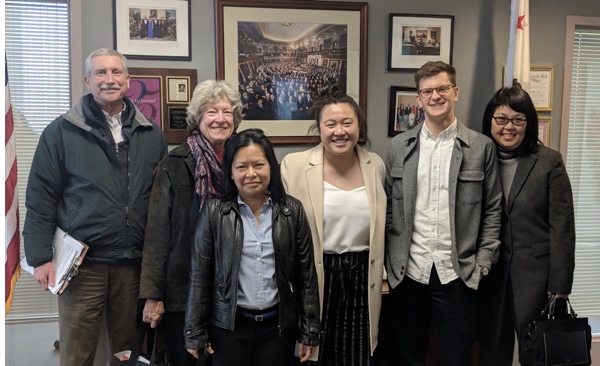My Climate Lobby Hobby
In a departure from this blog’s typical tech-related content, I’d like to write about some work I’ve done outside of the confines of my day job(s).

For the past few years, I’ve volunteered as a member of an organization called the Citizens’ Climate Lobby. CCL is a non-partisan, non-profit advocacy group whose mission is to build political will for solutions to climate change. Specifically, the group is laser-focussed on lobbying Congress to enact a policy called Carbon Fee and Dividend. This policy would make it more expensive for companies to extract and import fossil fuels, and thus help steer the economy towards better, cleaner sources of energy.
The hook of the policy (in contrast to others like California’s cap-and-trade system) is that the revenue generated by the carbon tax would be distributed evenly to the populace, as monthly dividend checks to all US citizens1.
To cut to the chase, I’m excitedly writing this post because my congresswoman, Rep. Barbara Lee, this week co-sponsored the bill we’ve been lobbying for, the Energy Innovation and Carbon Dividend Act. This is the culmination of many meetings and calls with congressional staff, letters to the editor, town hall appearances, fliers handed out at farmers’ markets, and alliance-building with other environmental groups. This achievement for our local CCL chapter here in Alameda County is one among many that are happening all over the country (including red districts) as we build a base of bipartisan support for this carbon pricing policy.
 Fig. 1. Photo of our team at a recent lobbying
meeting at Rep. Lee’s office in Oakland.
Fig. 1. Photo of our team at a recent lobbying
meeting at Rep. Lee’s office in Oakland.
That’s my story. I’m really proud of this accomplishment for our chapter and I wanted to share it. Getting involved with CCL has been a desperately-needed breath of fresh air amid the toxic political climate and news cycle we’re all living in. And it’s been a great way to meet inspiring people and learn the ground game of activism.
There are glimmers of hope for representative democracy in America, and it looks a lot like the Citizens’ Climate Lobby.
Thanks to Dr. Ted Obbard, chapter co-lead of CCL Alameda, for reading and providing feedback on drafts of this essay.
- There are a bunch of features that make the policy great, regardless of which side of the aisle you’re on. It’s effective because it would drastically and rapidly reduce carbon emissions. It’s good for the economy, given that it doesn’t increase the size of the government. It’s forecasted to create millions of jobs and it give companies predictable targets for fuel prices. And by putting money directly into people’s pockets every month, it’s an equitable solution that disproportionally helps out households in the lower end of the income spectrum. ↩